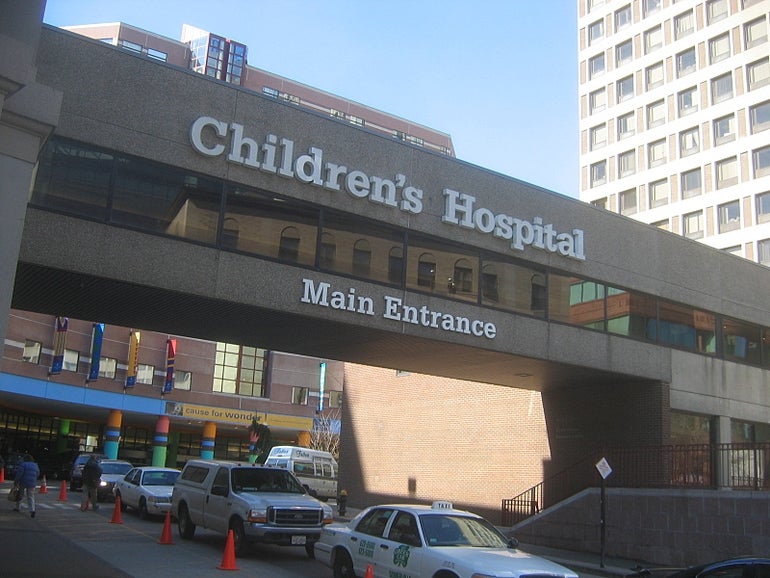State health officials on Thursday gave Boston Children’s Hospital the green light to move forward with a controversial $1 billion expansion.
The Public Health Council voted 10-0 in favor of the expansion, with one abstention.
“This is a project about patients. This is a project for the patient,” hospital president and CEO Sandra Fenwick said, telling the council there was an “urgent need” for new facilities. Fenwick said the hospital was at 99 percent capacity this morning and had to turn away two transports last night.
The project expansion earned the support of Gov. Charlie Baker, Boston Mayor Martin Walsh and the state Department of Public Health, but sparked outcry from critics who fear it will lead to higher health care spending and who oppose the demolition of a therapeutic garden on hospital grounds.
“The Public Health Council’s approval lays out a framework allowing Boston Children’s Hospital to upgrade their existing facilities and improve care for some of our most vulnerable children and their families, while incorporating unprecedented conditions and safeguards, including financial penalties and ongoing reporting, to prevent negative impacts on Massachusetts healthcare costs,” DPH spokesman Tom Lyons said.
The $1.068 billion expansion includes construction of a new 11-floor inpatient clinical building on the main Longwood Medical Area campus, renovations to existing campus buildings and redevelopment of a Brookline property into an eight-story ambulatory care facility. The renovation would add 71 beds to the now 404-bed hospital, along with four operating rooms and two magnetic resonance imaging, or MRI, machines.
Under state law, the Public Health Council must sign off on substantial capital expenditures or changes in service by health care facilities through what is known as the determination of need process.
Nora Mann, the director of the DPH’s determination of need program, told the Public Health Council that the hospital had demonstrated that it was “experiencing capacity constraints,” leading to long wait times for patients and a need for critically ill patients to reschedule diagnostic exams.
Children’s officials have said the expansion will allow them to enhance “family-centered” care and respond to increasing numbers of patients from outside the state and country seeking treatment for complex conditions. At the hospital’s current capacity, Mann said, out-of-state demand has the “potential to limit access for Massachusetts patients.”
The approval comes with a series of conditions, primarily aimed at ensuring access for Medicaid patients and preventing an increase in health spending. The hospital can “not cover its approved final incremental operating costs by passing on the costs” to payers and patients and must maintain its commitment to serving Medicaid patients and report data annually to the DPH.
If the hospital does not comply with its commitment to serve the needs of MassHealth and Children’s Health Insurance Program patients, it would be required to make a payment of up to 2.5 percent of the total project cost. This is the first time such a penalty has been recommended, according to the DPH.
“There has never been a backing off of our commitment to children with Medicaid,” Fenwick said.
Boston Children’s Hospital is among the largest pediatric medical centers in the country. The state’s Health Policy Commission last month, in a report later blasted by hospital officials, said the expansion could increase the hospital’s “already substantial market share,” destabilize competing providers and lead to an extra $8.5 million to $18.1 million in spending per year by commercial payers.
Lisette Blondet, the director of the Massachusetts Association of Community Health Workers, was the one council member to abstain.
Blondet said she could not vote on the project without seeing specifics on how the hospital will spend $53.4 million on community health initiatives for vulnerable populations. The approved plan calls for the money to be spent over seven to 10 years, with hospital staff presenting their “final funding plan” to the council in April 2017.
Before Wednesday’s vote, a group urging the preservation of the hospital’s popular Prouty Garden protested outside the State House, calling on the hospital and state health officials to delay action. They said the expansion threatens the future of the garden that provides families with a space to grieve and allows sick children to take a break from their hospital rooms and connect with nature.
Dr. Stephen Gellis, who has worked as the dermatology program director at Children’s for 28 years and joined the hospital staff eight years before that, said he believes the hospital is “on the wrong course at this point.”
“It’s just not the hospital I saw 36 years ago,” he told the News Service. “It’s very sad.”
Watch: Doctor, Parent Rally to Preserve Prouty Garden
During the Public Health Council’s meeting, Greg McGregor, the attorney for a citizens group fighting to save the garden, blasted the DPH’s conditions as “incoherent” and “riddled with loopholes.”
“You think this project is contentious now?” McGregor sad. “You think the evidence is hard to sort out now? You think the stakes are high now?…What will the hospital do when the staff indicates it would like to enforce the conditions? Well of course they will use the escape hatch that’s written there in so many words.”
Felix Arroyo, the health and human services chief for the city of Boston, read a letter from Walsh, expressing the mayor’s “strong support” for the expansion.
“Children’s Hospital was there when I needed it, and I want to make sure it will be there and thriving for all the children who follow,” Walsh, who fought cancer as a child, said in the letter.
Sarah Morris, whose 8-year-old daughter is a Children’s patient, also spoke in favor of the project. Morris said she spent 295 days in a neonatal intensive care unit with her daughter, and said families need space for privacy, which the expansion would allow.

